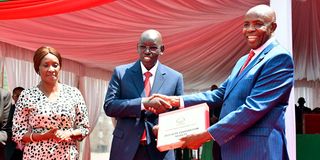Premium
Why this year’s exam candidates were not ranked

Education Cabinet Secretary Ezekiel Machogu (right) presents copies of the 2022 Kenya Certificate of Primary Education (KCPE) results to Early Learning and Basic Education Principal Secretary Belio Kipsang at Mitihani House in Nairobi. Looking on is Teachers Service Commission Chief Executive officer Nancy Macharia.
The Ministry of Education will no longer announce the top candidates in national examinations in an effort to eliminate negative competition, Education Cabinet Secretary Ezekiel Machogu has said.
He also revealed that he had briefed President William Ruto in the morning and he was in agreement of the decision not to rank the candidates. The CS caught the country unawares when he departed from tradition by not naming the top candidate in the Kenya Certificate of Primary Education (KCPE) exam when he released the results yesterday at Mitihani House in Nairobi. He only mentioned that the top mark was 431.
The Nation has tracked the two candidates — Lewis Omondi Otieno (St Peter's Mumias Boys Primary School) and Robinson Makokha Fwaro (Christ the King Primary School Bungoma).
Although the Kenya National Examinations Council (Knec) has not been ranking all candidates, it has been naming the top performers and their scores.
“Going forward, even for the Kenya Primary School Education Assessment (KPSEA) which we’ll release next month, there’ll be no ranking. It introduces unnecessary competition, which isn’t necessarily the case when there’s an instrument of measurement,” Mr Machogu told the Daily Nation.
In pictures: Celebration galore for 2022 KCPE exams top achievers
The CS revealed that for the inaugural KPSEA, done by in Grade 6 pupils, the learners will not be graded, but instead, their individual reports will be uploaded on the Knec schools portal.
“The report will show the learner’s areas of strength and where they need to improve. We’ll make learning more natural. We must ask ourselves; is it (ranking) good for the country and what effect it’s causing,” Mr Machogu said.
Knec CEO David Njeng’ere said ranking has been stopped because it fuels unhealthy competition and examination malpractices. “It doesn’t have merit. I wish we were discussing the quality of education and how exams can be used as a scorecard on the quality. That should be the conversation, like we have generally achieved gender parity in our education and that we have more learners in the average bracket. The tail is becoming shorter,” he said.
“We’re raising the stakes (by ranking) and some people feel they must be number one no matter what it takes. Can we bring down the stakes!” Dr Njeng’ere added.
He further explained that the reporting on KPSEA will be at three levels: individual, school-specific and national reports and that it will be useful in guiding the Kenya Institute of Curriculum Development, the Teachers Service Commission, the Ministry of Education, and parents and guardians on learners’ performance and craft interventions where necessary.
“The national report will be used to provide feedback to education stakeholders on areas that require intervention. The report will indicate the proportion of learners at each of the performance levels per subject and strand,” Dr Njeng’ere said.
He explained that the learners’ individual reports will indicate their performance level in specific subjects and strands including the acquisition of values and core competencies and performance level in specific subjects. The reports will be available by January 16.
The secretary-general of the Kenya Union of Post Primary Education Teachers (Kuppet) Akello Misori supported Mr Machogu on the move.
“It’s been our wish. Ranking brings about unnecessary competition, unnecessary examination anxiety. It’s a move in the right direction,” he said.
“We have significant improvement in the top mark but something which is alarming is that the candidates who scored below 300 marks seems to be more than those who scored 300 and above. This is an indication that something must be done about our quality. Because we’re having 100 per cent transition, we shouldn’t transit candidates to complete secondary school with such grades,” Mr Misori added.
The chair of the Kenya Private Schools Association, Mr Charles Ochome, said failing to rank candidates has its pros but warned that it may make learners and teachers not work hard enough.
“It’ll make the children not to panic and bring sobriety in the sector. However, as humans, we want to know how we compare with others. It’s like athletics. How can someone train hard when they know that they will go into a race and not be ranked?” Mr Ochome asked.
On junior secondary school, Mr Machogu said that he has appointed a multi-agency committee to draft guidelines on the transition to Grade 7.
“I expect to hold a meeting with all stakeholders on January 3 2023 to consider and release the guidelines so they can provide a roadmap to all players as they prepare for the junior secondary school,” he said.





